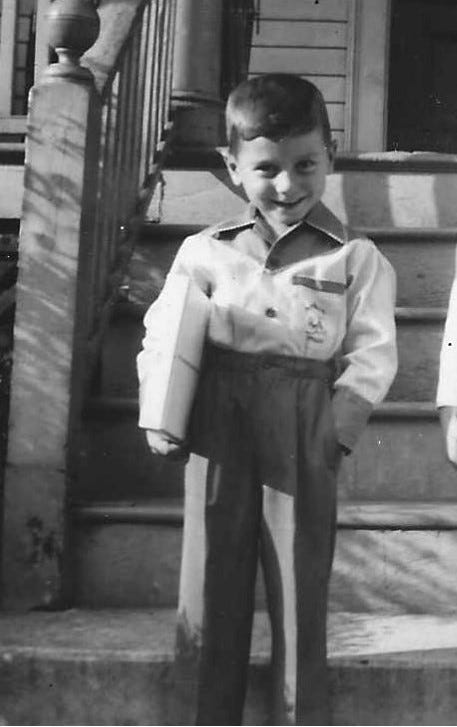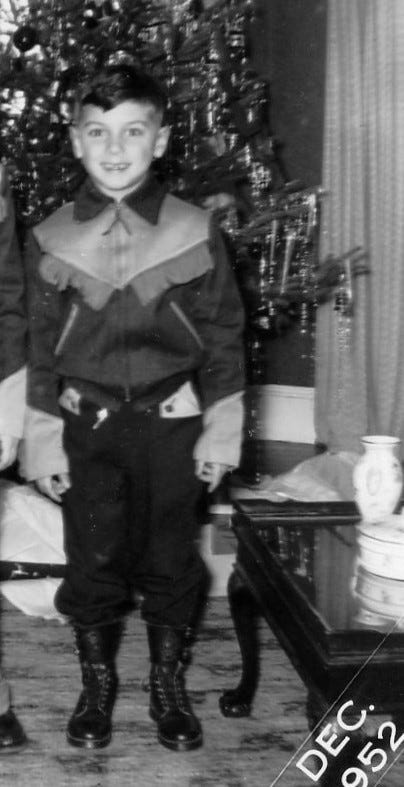Pickled Peppers and the Energy of a Cellar
"You smell like a pickled pepper!"
Last week’s story of the dill pickle reminded me of something a tad different, but related--- the Pickled Pepper Fiasco.
There was energy in the cellar of our three-family home on Wealth Avenue in Providence. It was unique. It was strong and solid. Its thick concrete foundation supported the weight of our three-decker home. Exciting, interesting, and sometimes frightening, it was a wonderful place to spend time.
It frightened me because it was dark and creaky; its darkness enhanced by small, dim, overhead bulbs lit by groping at pull-chains or fragile strings. Faint light, interrupted by exposed beams, struggled to penetrate the small, rusted, locked, cobweb-laced windows above eye level ---- too high to see anything but the bottom of the hedge across the driveway or a walker’s lower legs.
Its floor squeezed fine dust through its hard, cold cement.
Creepy shadows that draped the uneven walls and rested on the floor shivered me. Barely visible things in corners gave me pause. I was comforted by footsteps above. There was one way out, the way in; back up the eleven curving, worn, wooden stairs.
It was exciting because there were things to do, games to play, and places to hide. It was interesting because it told the stories of the tenants.
The first things I noticed as I descended the stairs from the rear entry were the smells: mildew, mold, the musty odor of grapes, wine, chicken feathers, cement, laundry soap, and pickling brine. The main cellar was illuminated by one overhead light that uncovered paint cans, a prehistoric washing machine, a deep double-square sink where the chickens were slaughtered and an overhanging shelf protecting a porcelain barrel.
Baseball gloves, football helmets, shoulder pads, and ice skates hung on nails. A Flexible Flyer and hockey sticks leaned against the wall. In a corner were a discarded 78 rpm turntable and a folded crib. Only the sports items and the sleds moved from the cellar. Otherwise, once something was deposited, it stayed in its place forever.
Three doors led from the main cellar to assigned storage rooms illuminated by the same dim bulbs. Nothing was off-limits. The doors were never locked. In each room, there were coal bins and burly furnaces that rumbled, rocked, and hissed when stoked with coal shoveled from the nearby bin.
Grandpa’s cellar was home to the wine press, the grape bin where a platoon of flies battled, a travel chest and a workbench with cement–covered masonry tools in a leather tool bag, which cemented itself over the years. Tools and bullet-like fuse boxes hung near the doors.
Uncle’s cellar was stuffed with tires, beach chairs, umbrellas, and other things, but most memorable was an oversized Flexible Flyer sled from Sears, the largest ever made; one that could accommodate his bulk and family of five.
Our cellar had an original American Flyer train set. Set on a plywood table anchored by wooden horses, its tracks wove through tunnels, a village, and over bridges. A heavy, cast-iron engine pulled a coal car, a lumber car, passenger cars, and a smooth, red caboose past streetlights, homes, a post office, and a school. When I ratcheted up the transformer, upping the voltage to its max, the train flew off the track at the second corner. That baby could fly, but its power was the root of its destruction; too many hits to the cement floor.
Black dust invaded the cellar when the coal man came. He opened the small window to the bin, cozied his truck’s chute to it, and opened the trap door of the truck. The coal slid down with a rumble and crashed with thunder when it hit the floor, then was contained by the wooden walls of the bin.
The empty bins remained after the switch to oil. They became our secret clubs and hiding places, transformed with a table, some chairs, comic books, a candle in a bottle, and posters of Roy Rogers, Gene Autry, Red Ryder, and Uncle Sam wants you!
Grandpa did some neat things in the cellar, such as killing chickens, making wine, repairing items, hand-wringing clothes, preserving tomatoes, lining up Mason jars, and pickling peppers.
In the corner of the main cellar, just below a shelf filled with masonry tools, old coats, leather straps, hats, and an assortment of artifacts that captivated a seven-year-old, was THE jar, the pickling pepper jar. It was a large, snow-white porcelain jar nearly overflowing with brine and bursting with pickling peppers. Despite the jar’s heavy cover, the pungent, mouth-watering aroma seeped out and filled the cellar, making its way up the stairs and out the door.
The bulky barrel supported a barely movable cover. It sat high on four cinder blocks. Grandpa’s peppers, pickling in pungent brine, irritated our nostrils, made our eyes water, and hurt our jaws with anticipation.
One day, my brother, standing on the cover to reach for something on the shelf above, paused when the cover started to rock. He balanced for a moment, then fell in up to his waist, the cover flipping and hitting his belt, the holster and his trusty cap gun. On this fateful day, he was wearing his cowboy best. His pants were drenched in brine, and his cowboy boots squished with pickle juice.
“My boots. My boots. They’re filling with pickle juice! My pants are soaked! My gun is ruined! I’ll never shoot again!” He was in a dither.
Sloshing juice over the rim, he slung one foot after the other over the jar and onto the floor. He was drenched and smelled like pickled peppers. He pulled a pepper out of a pocket and threw it onto the floor. A few flies followed him as he staggered up the stairs, leaving a trail of juice.
We buckled with laughter as we heard Mom shout, “Peter, what happened? You’re soaked. You smell like a pickled pepper! You’re pickled!” She laughed with that clever one. He was on the verge.
“I fell in Grandpa’s jar.”
“Take those boots off in the hallway. Take those clothes off. Get in here. Get in here before he sees or smells you.” The boots lingered in the hallway for weeks. They mummified and shriveled.
Over the years, the cellar changed; things came and went.
The newcomers were a ping pong table, a new washer, and bright lights.
Forts became too small, important stuff became uninteresting junk, the American Flyer went to heaven, the baseball gloves, football gear, and ice skates hardened, the posters curled, the wine press became moldy, the pickle barrel was empty, and chickens were killed someplace else.
A new tenant locked her door.
The cellar changed.
We changed.
We left the home eventually.
But the story of Peter’s descent into the pickle barrel lives.
© 2025




From my friend, Bob Aldrich "I can picture Peter's plunge into the pickled peppers and wonder how many pickled peppers did plunging Peter pluck from the pickle pepper plunge??"
Elsie, I don't know who delivered the oil, but I certainly remember Ms. Migliori.
Thanks for your nice note